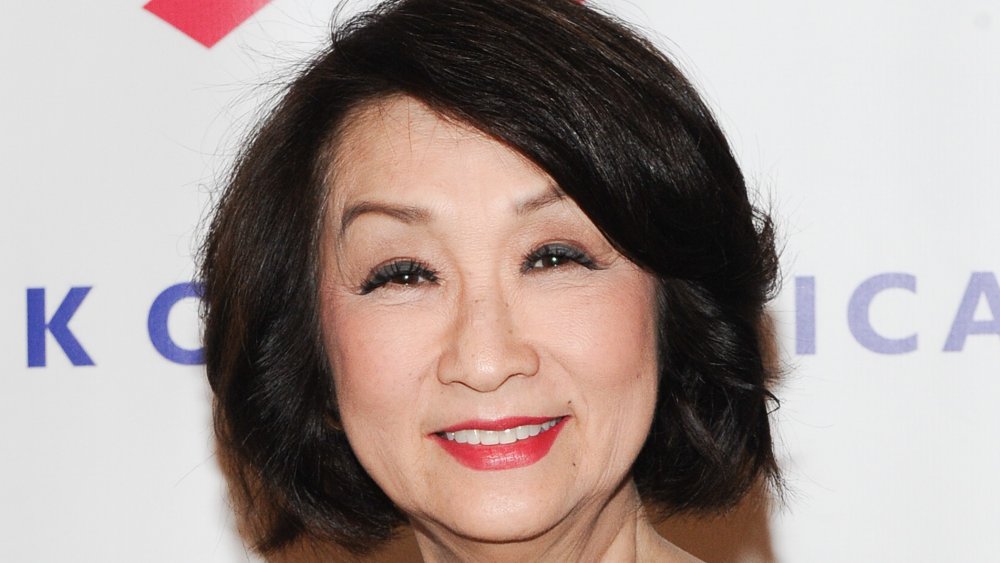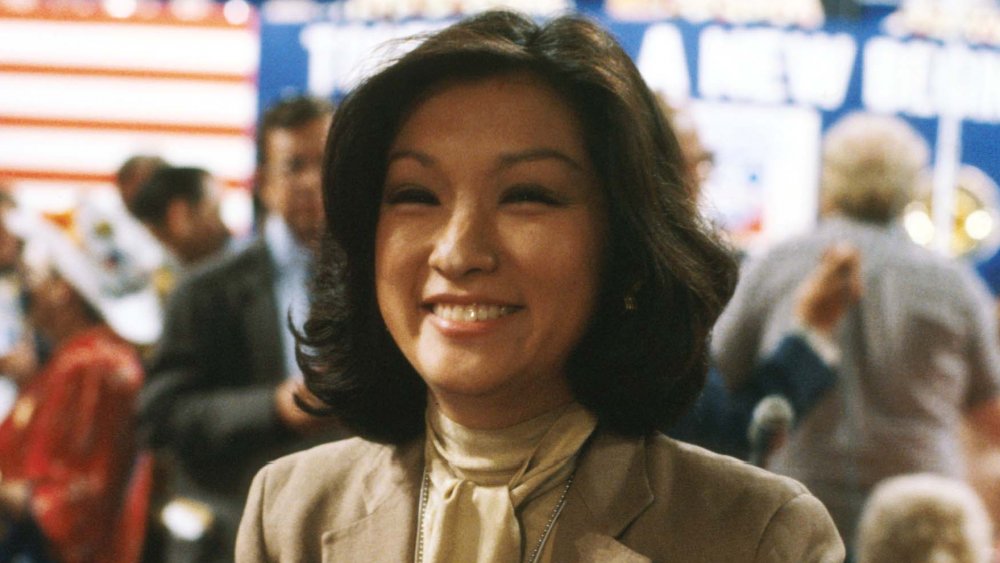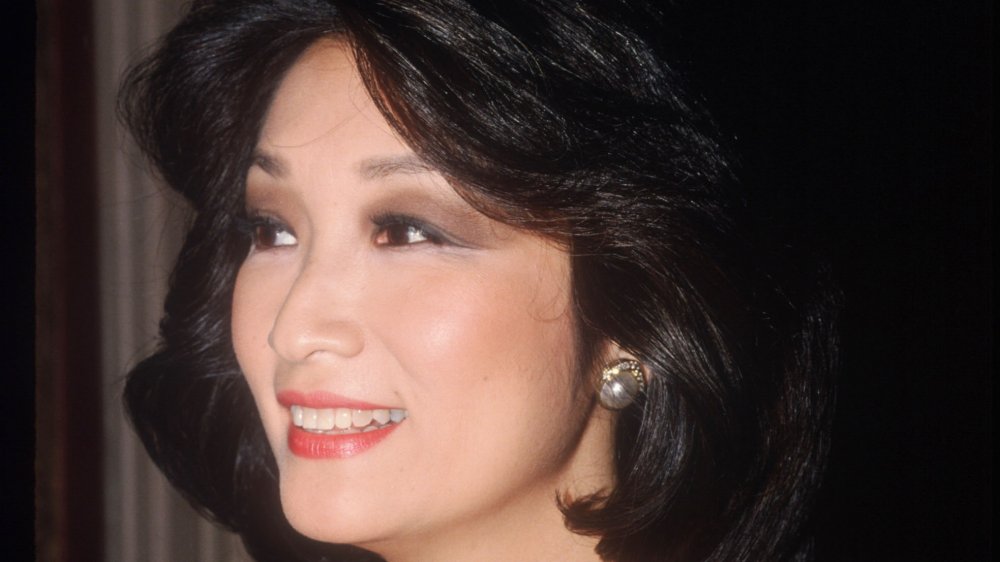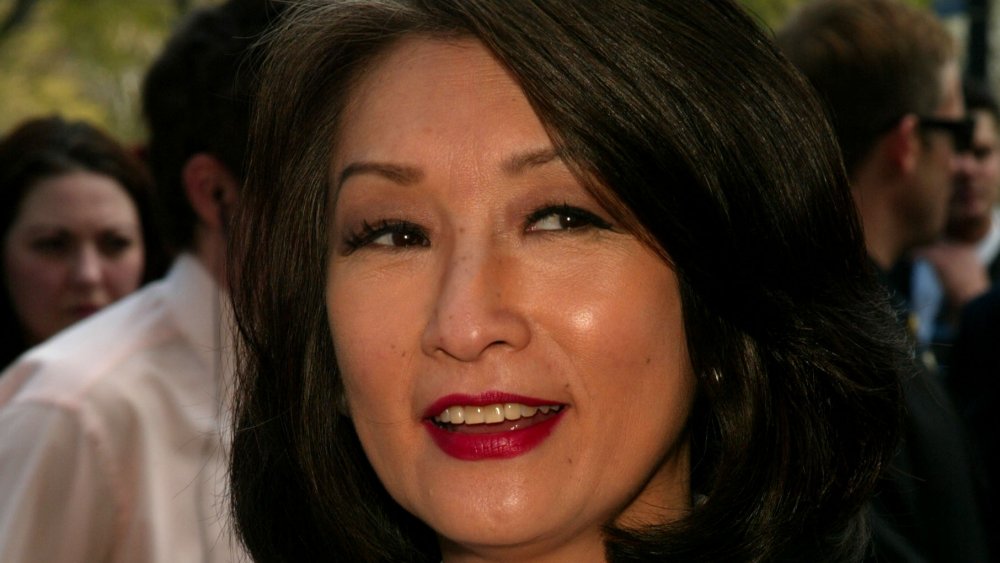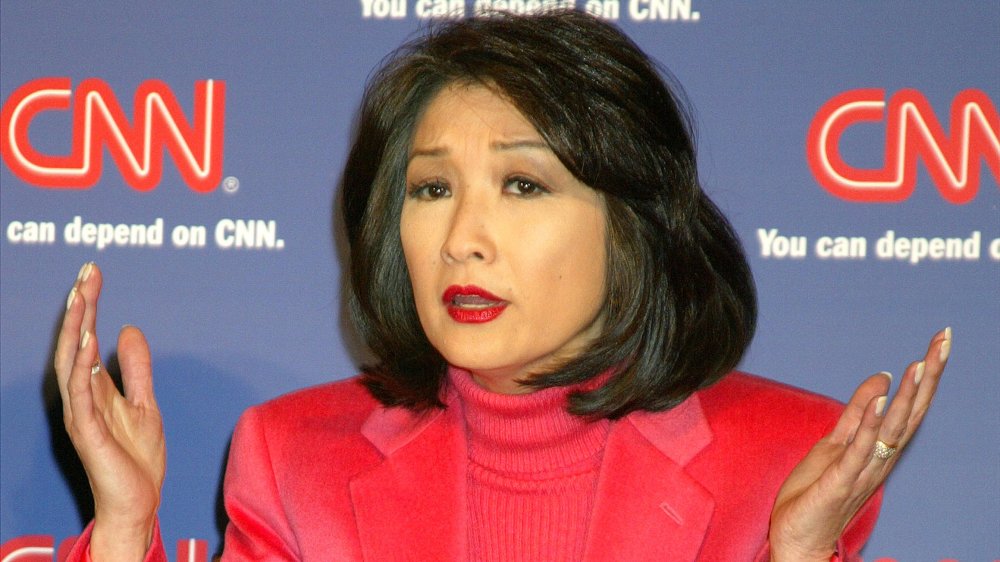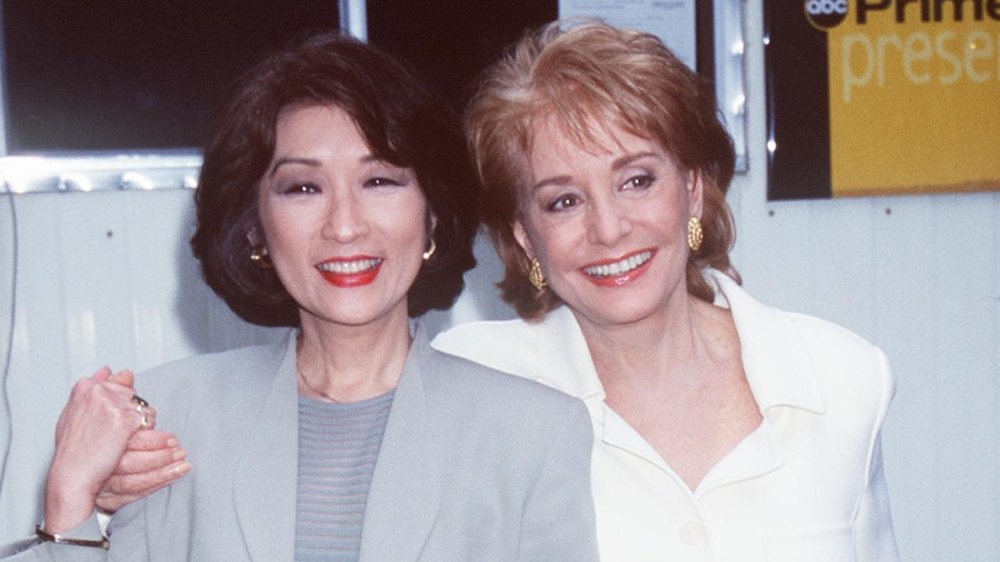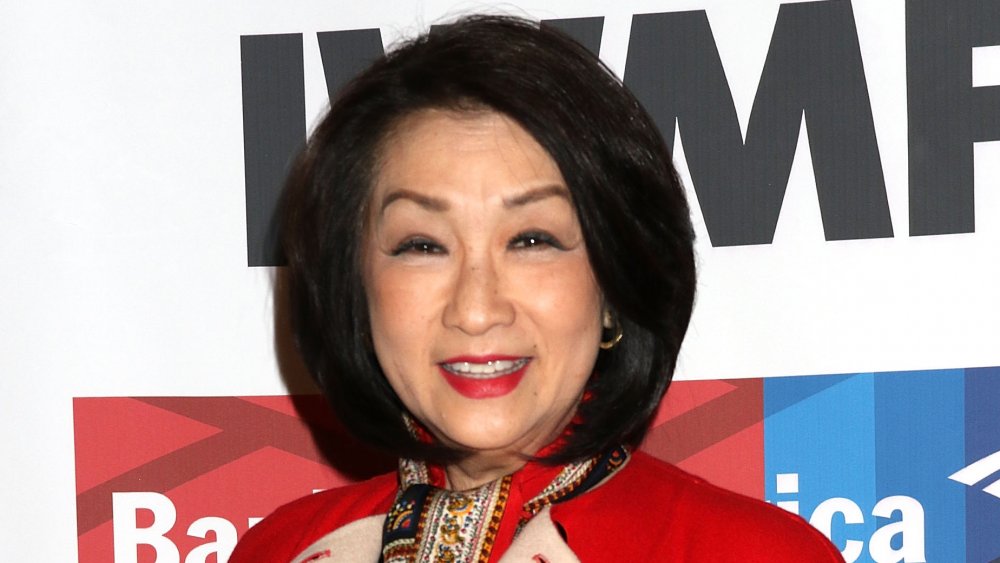Connie Chung Disappeared From TV. It's Now Pretty Clear Why
In the 1990s, Connie Chung was one of the most well-known journalists in the United States, if not the world. After growing up and studying around Washington, D.C., Chung got her start working in the capital during the Watergate era. She eventually made her way to NBC, then to CBS, where she co-anchored the CBS Evening News with Dan Rather, as well as her own show, Eye to Eye with Connie Chung. Chung also made history as the second woman and first Asian person to anchor a nightly news broadcast in the United States. Then, as quickly as she rose to the top of the heap, she all but disappeared. What happened?
At the height of her career, Chung became embroiled in controversy. A few of her interviews in 1995 caused panic at CBS, and, almost overnight, Chung was out. There was finger-pointing, betrayal, huge sums of money, charges of sexism, charges of yellow journalism — all the ingredients for the type of story that Chung would typically break. But instead of breaking the news, Chung suddenly found herself at the center of it. Here's why this well known journalist seemingly disappeared.
Connie Chung's career choice shocked her family
Connie Chung was born in Maryland to recent-immigrant parents from China. As the youngest of ten children, Chung said her family found her decision to study the then-budding field of television journalism surprising. "For a small, diminutive-sized Chinese person who grew up in a very loud family and never spoke up in her life, it was dramatic," Chung told NPR in 2011.
After graduating from the University of Maryland, Chung got a job as a correspondent in Washington, D.C. for the CBS Evening News with Walter Cronkite. It was at this job that she proved her knack for chasing the story. She shared an anecdote on Watch What Happens Live in 2018 about an impromptu interview with President Richard Nixon during the height of the Watergate scandal. "I happened to be walking into the White House, and he's just standing there," she told Andy Cohen. She recalls not taking out her pen and notepad, hoping to encourage him to keep talking without getting scared. The result: She went on the air later that evening with an exclusive scoop.
After bouncing around a bit in the 1970s, Chung eventually found a home at NBC in 1983, anchoring the morning show NBC News at Sunrise. She also anchored the NBC Nightly News on Saturdays, and served as Tom Brokaw's substitute when he could not make weeknight appearances.
Connie Chung says she was sexually harassed 'every day'
As a young journalist, Connie Chung's success came with the challenge of dealing with sexism and wholly inappropriate treatment from men in the industry. It wasn't until after the #MeToo movement that Chung felt comfortable enough to talk about her experiences. In 2018, talk show host Andy Cohen asked Chung if she was sexually harassed in her career, and she told him, "Yeah. Every day." Adding a bit of levity, Chung added, "Let me say for the record that anybody that sexually harassed me is now dead."
That same year, Chung wrote a letter in solidarity with Dr. Christine Blasey Ford — the woman who became a lightning rod during the confirmation hearing of Brett Cavanaugh to the Supreme Court. In a letter published in The Washington Post, Chung revealed that she was sexually assaulted in college by the doctor that delivered her in 1946. Her experiences with sexism and harassment and assault informed her work and contributed to her desire to prove herself as a journalist. Although she faced sexism, her gender was only one of the things that made her an outlier in her field in the 1970s and 1980s. She told NPR that she believed her age, heritage, and relative inexperience also contributed to people giving her a hard time.
Connie Chung moves to primetime
After six years at NBC, Connie Chung moved back to CBS. At first, she headlined weekend coverage, anchoring the CBS Sunday Evening News and Face to Face with Connie Chung on Saturdays. Then, in 1993, she was promoted to co-anchor of the CBS Evening News, sharing the spot with Dan Rather. The decision to have two co-anchors was immediately criticized, even by Chung, who compared it to playing "Pattycake" during a 2011 interview with NPR. Face To Face With Connie Chung also evolved into the primetime Eye to Eye with Connie Chung
Though Chung did have several interviews that were remembered for good reason, such as her interviews with Bill Gates as Microsoft began to take over the world and with Magic Johnson following his HIV diagnosis, it was not long before her work came under fire for both its format and content. Both Chung and CBS were criticized for what The Baltimore Sun described as embracing "the tabloid sensibility and mindless celebration of celebrity." Interviews with disgraced figure skater Tonya Harding and with Faye Resnick, who made headlines at the time for her friendship with O.J. Simpson's murdered wife, Nicole Brown Simpson, drew big ratings as well as backlash. In 1995, Chung anchored two now-infamous interviews that damaged her career beyond repair.
Connie Chung and the whisper that tarnished her career
In January of 1995, Connie Chung interviewed Kathleen Gingrich, mother of then-Speaker of the House Newt Gingrich. Reflecting on the interview more than 15 years later, Chung told NPR, "You know how other women who don't want to utter a word that is not so pleasant, like 'he's got cancer' or 'he had an affair'? She was doing that all during the interview." Not getting the scoop she wanted, Chung tried a new strategy.
She asked Kathleen what her son thought of first lady Hillary Clinton. Chung told Kathleen she could whisper the answer, and so Kathleen very quietly said this: "He thinks she's a b****." Kathleen claimed she did not know she was being recorded, which Chung claimed was a lie. In either case, Chung was heavily criticized for what many perceived as journalistic malpractice.
Months later, an interview Chung conducted following the Oklahoma City Bombing essentially ended her career at CBS. Interviewing a member of the Oklahoma City fire department, Chung asked: "Can the Oklahoma City Fire Department handle this?" Her tone was widely perceived as sarcastic, and, already on thin ice from her Kathleen Gingrich interview, people were apparently not willing to give Chung any benefit of the doubt. Letters and calls poured in from around the country, and even Chung's co-host, Dan Rather, reportedly complained. A month later, Chung was out at CBS.
An ungraceful exit
After the Oklahoma City interview, CBS reportedly gave Connie Chung a choice: Move back to weekend news or resign. Chung had no interest in moving back to the weekend and attempted to get CBS to buy her out of the rest of her contract, valued around $2 million with less than a year remaining. Co-anchor Dan Rather claimed he was somehow blindsided by her departure. "I knew nothing about what was going on until two newspaper people called me," he told Entertainment Weekly in 1995
For Chung's part, she alleged that sexism played a role in the scrutiny and eventual dismissal of her work. Per The New York Times, Chung compared her situation to Barbara Walters, the first woman to hold a national anchor position, who was "treated coldly" by a male co-anchor on ABC in the 1970s.
ABC World News Tonight Producer Emily Rooney felt like Chung had been trapped in a lose-lose situation. "It was unfair that CBS recruited her. They liked her entertainment flair and wanted a lighter touch, then wanted her out for the same reasons," Rooney told Entertainment Weekly.
While Chung was able to move onto other work, that controversial period in her career hurt her credibility and followed her for a long time.
Where is Connie Chung now?
In the decade following her exit from CBS, Connie Chung bounced around between networks, spending three years with ABC before getting her own show, Connie Chung Tonight, on CNN. That program did not receive good ratings and lasted only about a year before being canceled at the onset of the Iraq War in 2003. In 2006, Chung co-hosted Weekends with Maury and Connie alongside her husband, Maury Povich. The couple adopted a son together in June of 1995.
Today, Chung is all but retired. Though she still appears once in a while on different TV panels and interviews, she has not anchored a show since 2006. That said, she continues to speak out about what she believes still needs to change in the news industry, and specifically television news. "I don't believe women should be intimidated by the threat of losing their jobs," she told The Hollywood Reporter in 2019. Speaking about sexism in the industry, Chung said, "I think there needs to be a better cleansing of all the news organizations. The attitudes still have to change to some level of parity between men and women."

